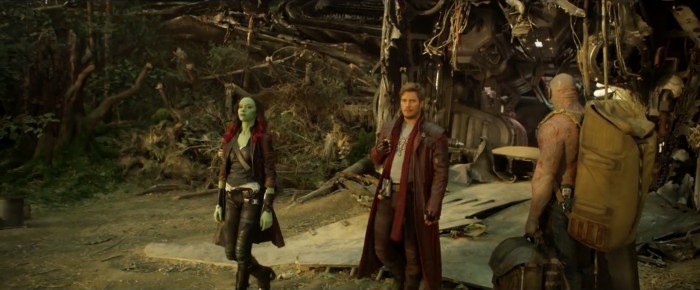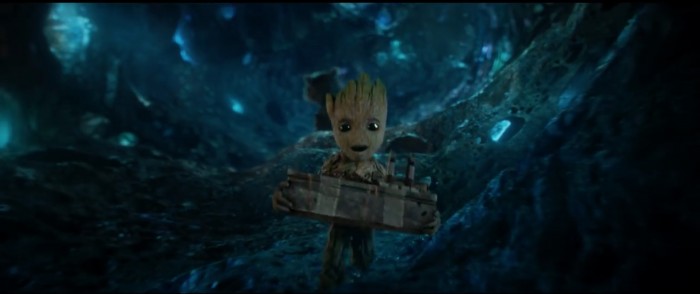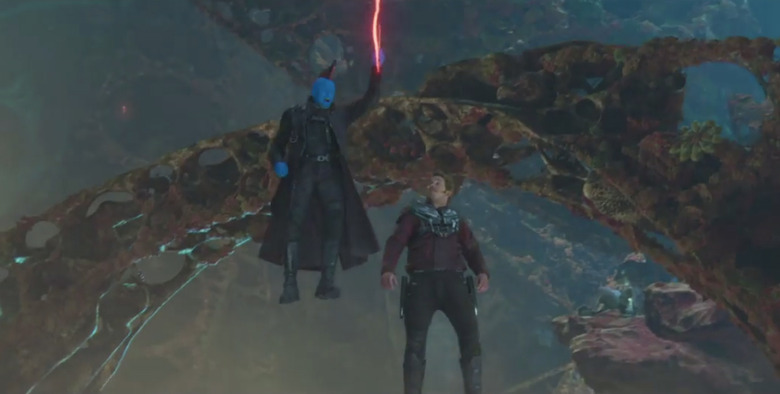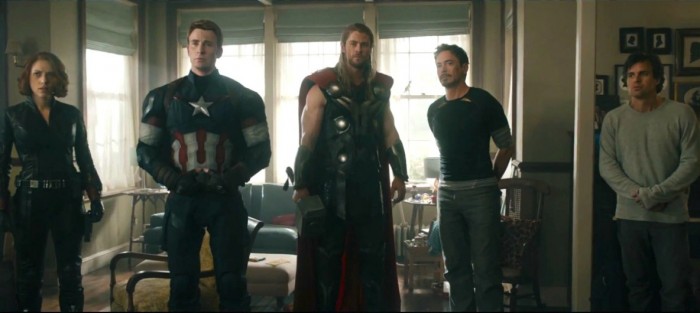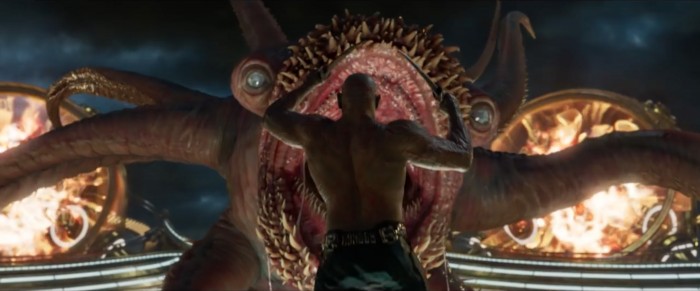What 'Guardians Of The Galaxy Vol. 2' Gets So Right – And What 'Avengers: Age Of Ultron' Gets So Wrong
(Welcome to The Soapbox, the space where we get loud, feisty, political, and opinionated about anything and everything. In this edition: why Guardians of the Galaxy Vol. 2 is so great...and how it exposes problems in other superhero movies.)
Here we are, celebrating today's Guardians Of The Galaxy Vol. 2's Blu-ray release, and I'm still asking myself the same question. How did James Gunn's lovable superhero squad go from space-cowboy-nobodies to (some of) the world's favorite comic movie heroes?
Star-Lord sauntered into the Marvel Cinematic Universe with minimal mainstream presence, flanked by a ragtag posse of oddballs. A gun-nut raccoon who talks? His walking, single catchphrase tree friend? Gunn had to establish singular origins, unite an Avengers-like alliance, and rock a grandiose space opera in Guardians Of The Galaxy. Then Vol. 2 needed to advance team-building, introduce even more characters and calcify the same emotional backbone. Frankly, none of this should have worked. Like how Suicide Squad attempted the same big-team buildup with half/a quarter/none of the same results.
Yet here stands James Gunn, with two of the most famous, successful, recognizable Marvel entries to his name. His success is even more impressive when you compare it directly to one of Marvel Studios' "bigger" and more central movies: Avengers: Age of Ultron.
Hooked on a Feeling
I can still remember the exuberance that filled my second Guardians Of The Galaxy Vol. 2 theater viewing. Children busted out Baby Groot's dance moves to ELO's "Mr. Blue Sky." Adults mimicked Drax's bellowing laugh. People love these cocksure weirdos and their juvenile maturity. And frankly, what's not to love? Cartoonish caricatures play a defining role in Gunn's cosmic crusades, but there's deeper connectivity that I hold above a puking Baby Groot or severed human toe. This is something not all Marvel movies establish equally.
What's my favorite thing about these Guardians movies? Easy. I genuinely, deeply care for Gunn's family of misfits. Star-Lord to Nebula. John C. Reilly to Groot. Every life matters, and that's not always a given under Marvel's umbrella.
Thanks to James Gunn (and Nicole Perlman, co-writer on Vol. 1), Marvel's Guardians of the Galaxy line-up is more than just a collection of toned, spandex-clad heroes. Gunn understands what it takes to connect audiences with larger-than-life characters. Dramatic beats aren't met with the same throw-away gazes and forced conflicts that fill city-smashers like Captain America: Civil War. Each Guardian has felt life's cruel touch, unable to healthily express their pains, frustrations or sadness until joining forces. It's not the most unique beginning (most superheroes wrestle with haunted pasts), but Gunn's treatment is comforting and warm.
Come a Little Bit Closer
Don't get me wrong. A movie like Captain America: Civil War ramps excitement with ease, but we never feel the human (or inhuman) stakes at play. I know many Marvel fans will disagree, but for me, it often feels like a child slamming their favorite Steve Rogers and Bucky Barnes action figures together, as "teammates" are assembled with promotional appeal coming first. You know, the whole "Cram as many familiar faces on screen with or without establishing depth?" We're often more taken by how characters mirror their comic representation or what cameo may await – never soulfully affected by the events that take place.
Maybe it's an unfair nod because the Guardians were a gamble to begin with. Gunn took a shot in the dark on building a legacy from scratch. Thor? The Incredible Hulk? Their history is rich and legacy undenied. Star-Lord? Rocket Racoon? These are characters who most mainstream audiences would be meeting for the first time. There needed to be an instant connection, which Gunn ignited by molding the "unlikely companion" angle evident in every group shot. With such freedom, screenplay details were never shackled to preconceived notions. Gunn set out to introduce the world to its favorite dysfunctional space family (before they knew it), and his mission was accomplished handily in Vol. 1.
That's not to say Marvel's never tested such tactics – but it's all in execution. Quicksilver's lightning-fast entrance and exit in Avengers: Age of Ultron marks a low-point in MCU history. This has nothing to do with Aaron Taylor-Johnson's acting or bad accent (well, maybe a little), but rather the film's inability to ever make us care for a character whose minimal inclusion is mistaken for something vastly more impactful. He's a pawn sacrifice – an excuse for Scarlet Witch to feel more than the pain of being used by Ultron.
Or you have the reverse – when Don Cheadle's War Machine crashes down in Captain America: Civil War. The death of James Rhodes could have sent cataclysmic shockwaves through the immediate Avengers universe. A Cap vs. Iron Man vendetta for the ages. What happens instead? Rhodey pops up later on, donning a Tony Stark invention meant to ease his long road to recovery. Time and time again, we're reminded that most Marvel characters are untouchable deities. I guess unless you're evil, insignificant or. well, Aaron Taylor-Johnson.
Thankfully, and tragically, Gunn has no such reservations when it comes to his characters.
Come and Get Your Love
Despite the focus of Vol. 2 being on Quill's Ego drama, Yondu's quest for redemption fingers the film's strongest pulse. Not only does Michael Rooker refer to himself as Mary Poppins like a boss, but his arc offers life-changing salvation that so tragically relates to the human condition. Here he is, a galactic pirate with a rap sheet that'd unscroll for miles, but he's not immune to torturous insecurities. Yondu offers honest admissions during his heart-to-heart with Rocket (that also grant the furriest Guardian his own "enlightenment" moment). Then he goes all father-of-the-year by saving Quill, because Gunn's characters are allowed – nay, proud – to see full arcs to completion, as painful or sobering they might be. Laugh in death's face, reveal your hand and go out photons blazing. I'll take the wallop of Yondu's sacrifice on his terms over the possibility of future MCU appearances every single time.
There I was, in the theater for another Guardians film, trying to hold it together, Michael Rooker's smurf-colored performance bringing a quiver to my lip. Then Quill gives the Hasselhoff monologue, and yes, laughs are shared – but the quivering gets worse. No tears, though. Good job, Matt. Wait, more spaceships? Sylvester Stallone (as Ravager big-dog Stakar Ogord)? The fireworks, and honorable send-off Yondu dreamed of? R.I.P. an entire box of tissues. It's certainly not a reaction I'd had to any non-Guardians MCU development to date.
Time out. Let me make a quick clarification here. As I've been saying "Marvel," what I mean is "Disney Marvel." Fox showed they have no moral issue with killing major superheroes – cough, Logan, cough – and look how that turned out? I'm not saying it's necessary, or always warranted, but Marvel has had a real issue with abandoning mass appeal on this front. We know someone "significant" will be killed off during the MCU's Infinity War, but up until now it's mostly been parents, fakeouts and enough henchmen to fill Rhode Island.
So how is it that James Gunn has turned me into a blubbering mess not once, but twice, with an escaped zoo experiment and alien lifestyles? Joss Whedon couldn't do so when killing off Pietro Maximoff. Nor could Tilda Swinton monologuing about death and purpose in Doctor Strange. Only Gunn has evoked the type of filmmaking that colors far enough outside Kevin Feige's mailable but confining formula. I'm not foolish enough to talk ill of Marvel's structure because it works – but don't pretend directors have 100% creative freedom. A filmmaker like Edgar Wright couldn't thrive under such conditions, and while films may have a different feel hero-to-hero (Ant-Man is heist comedy, Winter Soldier is a '70s political thriller, etc.), they're all made of the same tissue.
Except Guardians Of The Galaxy, which is weird enough a property to be given carte blanche.
I'm Not in Love
Avengers: Age Of Ultron is an example of everything formulaic, forgettable and action-focused in the MCU. Whedon's just checking blockbuster boxes; a statuesque representation of everything Gunn's Guardians Vol. 2 is not, despite their narratives being eerily similar. Both kick off with action, institute a common evil who threatens to tear the group apart, villains defect to the side of good, a death is leveraged, and the team is better for it. Big baddies played by big-name stars, side-stories galore – it's all mirrored. The defining difference is that one film composes sci-fi beats like David Bowie, while the other phones in rhythmic repetition like another one-hit wonder. Gunn the colorful cartoonist, Whedon the rigid stenciler.
When Avengers: Age of Ultron opens, Cap and friends are already mid-siege in Sokovia. Baron Strucker guards a scepter while Iron Man makes fun of Cap's squeaky-clean "Language!" comment. The same "Oh you!" winking, the same busted up Hydra thugs. No lead-in or anticipation – quite the opposite of Gunn's double-down monster fight at the beginning of Guardians Vol. 2. Y'all liked Star-Lord's dance number in Vol. 1? Y'all like Baby Groot? Well here's a collage of crystalline shimmers, space tech weapons, and a tremendous opening gag that tops Vol. 1 while still introducing necessary information. The Guardians moonlight as contracted security and Baby Groot has the personality of a toddler. Stage set, viewers hooked. Point, Gunn.
What about the bad-turned-good arcs when comparing Pietro to Yondu? Granted, Yondu is never an out-and-out villain. Pietro is clearly on the side of Ultron when Whedon's film begins. Still, both are given the redemptive angle of self-sacrifice in the line of duty. Gunn takes the time to make us connect with Yondu over two films, and Michael Rooker's acting makes a martyr of the murderous blue Ravager. Whedon, on the other hand, gives Pietro a handful of scenes and kills him without emotion. Wanda Maximoff lets out a telekinetic boom and drops to her knees, but that's it. Gunn grants Yondu an open casket, Quill's tearful eulogy, and then a fireworks send-off capped by a hundred Ravager chest pounds. Whedon kills Pietro, has Hawkeye lay next to him (could have been Clint, we get it), and that's a wrap on Pietro! Point Gunn, forever and ever.
Even shades of tone prove how Gunn better grasps humor and compassion, which might be Whedon's biggest downfall in Age Of Ultron. All those random dick jokes from Iron Man? "Performance" lines and a "hide the cucumber" Hulk zinger? I get that Tony Stark is a snarky sod, but these "jokes" either kill moods or are overtly robotic in their predictability. Gunn's sense of fun is genuine and childlike, wide-eyed and enthusiastic about the very same kind of material. Whedon, I don't know...feels above it?
In no world are jests about Drax's famously large turds and praise of Kurt Russell's sweet man-piece considered highbrow. That I acknowledge. It's just that Gunn more clearly establishes the Guardians' universe for material of that humor level. Those planet-warp bits that distort Yondu's ship crew like a Rocko's Modern Life acid trip. Rocket's trap that tosses Ravagers into the air. It all welcomes wackiness, where Whedon feels like he wrote an action script and was asked to pencil a few jokes in the day before filming. Point Guardians. Point Gunn. One big point to Kurt Russell.
Side-arcs, most of all, are beyond comparison. Whedon has the bigger task – that's understood. Within Avengers: Age of Ultron, he's forced to build towards inevitable franchise additions years down the timeline. Introduce Wakanda. Tease romantic entanglement. The list goes on. Gunn? He plays mainly in the Guardians' sandbox, but massages simplicity in a way that almost mocks Whedon's "style." Age of Ultron is just a highlight reel of necessary moments – Hulkbuster Iron Man! Black Panther tease! Black Widow crushin' on Big Green! Cap vs. Tony! – that all end in another Marvel villain's failed sinister apocalypse. Gunn keeps things easy – Rocket's hardened shell, Quill's desire for a father figure, Gamora's sibling issues – and so human. Both building worlds, both juggling many balls, but Gunn does it with double the sincerity. Who else could make me cry with a talking, enraged raccoon?
Maybe Gunn's beats are easier to connect with if you share similar feelings with the Guardians (big themes, probably not space-assassin specifics). Maybe you've felt like an outcast your whole life, and here come these heroes who've been similarly painted. Guardians of the Galaxy speaks for so many (in the most unlikely language) because they're the gang who seem like they don't belong. That I can look at Rocket and see my own imperfections is something of a miracle.
Bring It On Home to Me
When I recall my fondest memories of Guardians Of The Galaxy Vol. 2, it's not of Drax's bluntness. Nor Baby Groot's cuteness that spares him from a Ravager's dagger. It's of Yondu's ashes shaping an arrow as the Guardians gaze misty-eyed upon the hundred-or-so Ravager ships all saluting their fallen comrade. It's of Baby Groot sitting in Quill's lap with a Zune earbud pressed to his bark, that big ol' wooden face full of wonder while Cat Stevens sings about fatherhood. Drax's "beautiful" comment to Mantis. Rocket's hatchet-bury with Quill. The "unspoken" thing that might just become talked about. A cheesy snap of Quill and Ego playing catch with a plasma ball. These are the heavy, moving moments that separate Gunn's lovable outcasts from cheap Avengers-grade thrills. The ones that make Star-Lord and Yondu more family to me than Dominic Toretto's fast-and-furious crew. Cry blasphemy all you want.
I may enjoy watching the Avengers suit-up, but it's purely for entertainment purposes. That's not the case with Guardians of the Galaxy Vol. 1 and Vol. 2. Gunn is doing something with his Guardians that no other Marvel subfranchise holds a candle to. By taking a chance on the little guy, he's turned obscure vagabonds into mainstream icons who'd otherwise be viewed as freaks or lunatics. But they're our freaks and lunatics. A sideshow collective who we view as our own, because Gunn's nurturing hand makes the Guardians films just as much about us as they're about blockbuster display of brand potential. There's a reason why fans immediately fell in love with this cosmic crew of renegades. It all starts with characters, and these Guardians are certainly the most affecting, emotive and fully realized family of heroes that Marvel has put forward as of yet.
Famously large turds and all.

